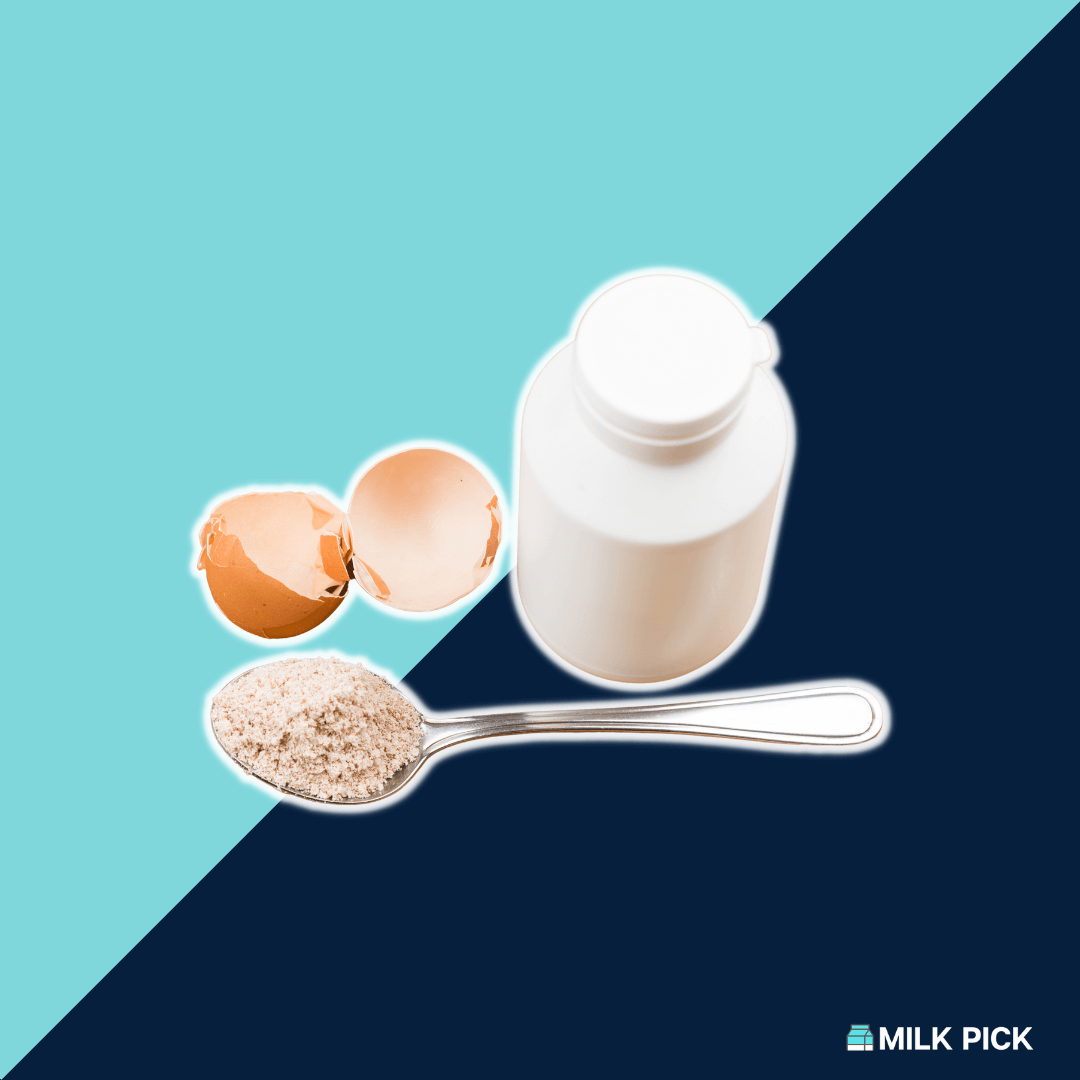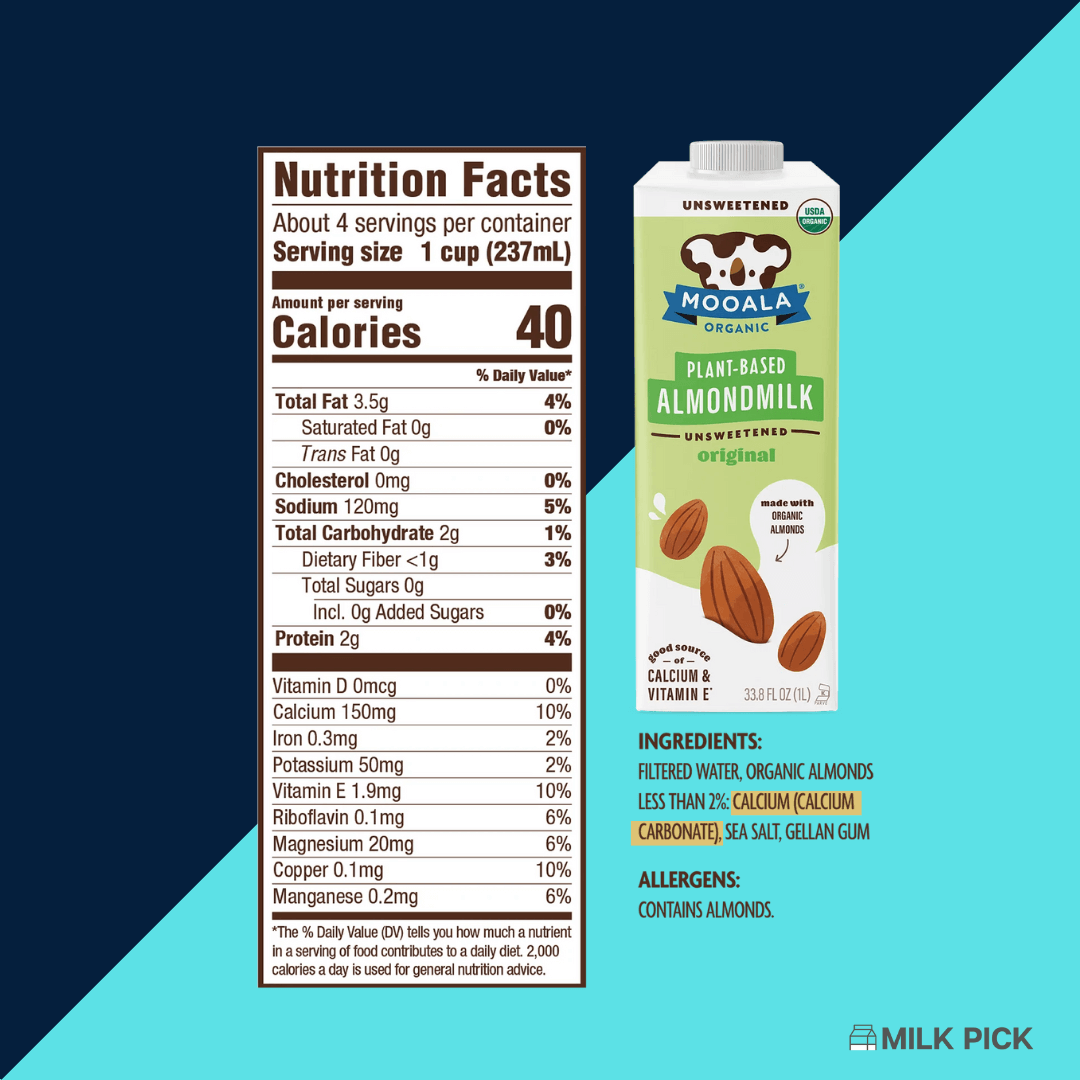Sometimes it seems like there are thousands of variations of almond milk on the grocery store shelf.
- “50% more calcium!”
- “Added vitamin D”
- “Naturally flavored”
With all these different versions, it can be hard to see what sets one almond milk apart from another.
To really understand what you’re drinking, you have to flip the bottle over and look at the ingredients.
We always recommend almond milk with minimal and clean ingredients, but unfortunately, some almond milk is filled with additives.
One common additive you might find in almond milk is calcium carbonate.
Keep reading to learn what calcium carbonate is, why it’s in your almond milk, and if you should be avoiding it or not.
What is Calcium Carbonate?
Calcium carbonate is a white, odorless powder primarily comprised of carbon, oxygen, and calcium.
It’s a chemical compound found in rocks worldwide, like limestone and marble. In fact, calcium carbonate makes up about 4% of the earth’s crust.
Calcium carbonate is also the main component of egg shells, shellfish skeletons, and pearls.

What Does Calcium Carbonate Do?
Calcium carbonate, also known as carbonic salt of calcium, is used as a dietary supplement to increase a person’s calcium intake.
Proper calcium intake is vital to a healthy body as it’s the primary mineral responsible for strengthening your teeth and bones.
Calcium carbonate can also be used to treat heartburn, upset stomachs, and indigestion. But what does this have to do with your almond milk?
Related: Is Almond Milk Good For Your Bones?
Why Is Calcium Carbonate in Almond Milk?
Think of the last advertisement you saw for almond milk. If it said a glass of their almond milk has the same level of calcium as a glass of cow’s milk, it’s likely fortified with calcium carbonate.
There are a few different calcium supplements almond milk companies use to fortify their milk, but calcium carbonate is the most common.
Almond milk companies tend to choose calcium carbonate because it’s inexpensive and a generally well-absorbed calcium supplement.

Is Calcium Carbonate Good for You?
The FDA generally recognizes calcium carbonate as safe.
The issue that could arise comes from the excess calcium in your diet.
Remember, calcium carbonate is a calcium supplement.
If you already get enough calcium in your diet, drinking almond milk with a calcium supplement could raise your calcium intake to an unsafe level.
For instance, higher-than-normal calcium levels can lead to hypercalcemia.
In mild cases, you may not experience any symptoms from hypercalcemia, but in more severe cases, it can cause the following:
- Digestive Upset - You may experience digestive upset like vomiting, constipation, nausea, or a general upset stomach.
- Brain Fog - In some cases, hypercalcemia can affect how your brain works and leave you feeling confused, lethargic, or fatigued.
- Overactive Kidneys - An excessive of calcium in the body forces your kidney to work overtime to filter it, leading to excessive thirst and frequent urination.
- Heart Function - In rare and severe cases of hypercalcemia, you may experience heart palpitations or other heart problems.
So, is calcium carbonate harmful?
On its own, calcium carbonate is not harmful. However, it may become harmful if you have a pre-existing medical condition, like high calcium levels.
If you’re not sure if drinking almond milk with calcium carbonate is good for you or not, consult your doctor.
Should You Drink Almond Milk with Calcium Carbonate?
While calcium carbonate is generally recognized as safe, there is a lot of debate about whether or not adding it to almond milk is necessary.
In general, we believe almond milk with clean ingredients is ideal and recommend almond milk without calcium carbonate.
For instance, brands like Elmhurst, Malk, Three Trees, and JOI are great options.
We recommend these brands because the ingredient list is small and all real ingredients.
For the most part, all these brands make almond milk comprised of only almonds, water, and salt.
However, brands with cleaner ingredients tend to be pricy, so don’t feel pressured to throw out your current almond milk and buy one of the ones we recommend if it’s not in your budget.
You can still find healthy almond milk with cleaner ingredients by looking at the ingredient list and picking milk with minimal additives.
If you’re not sure where to start, unsweetened almond milk tends to have the cleanest ingredient list.
With that in mind, drinking almond milk with calcium carbonate is a personal decision.
We choose to drink almond milk without additives like calcium carbonate, but almond milk with calcium carbonate is not the worst thing on the market.
It all comes down to what you look for in your almond milk.
Without Calcium Carbonate, Is Almond Milk a Good Source of Calcium?
Unfortified almond milk is not a great source of calcium.
For example, whole cow’s milk typically has 300mg of calcium per serving, while unfortified almond milk (in this case, we’re looking at Elmhurst) has about 7mg per serving.
If you’re thinking of switching to almond milk but are concerned about your calcium intake, you might want to look elsewhere to meet your calcium needs.
Should You Buy Almond Milk With Calcium Carbonate?
In the end, calcium carbonate is a supplement and isn’t necessarily something you should avoid at all costs.
Whether or not you drink almond milk fortified with calcium carbonate is a personal decision.
Either way, it’s a good idea to get in the habit of checking the ingredient list on your almond milk. While calcium carbonate is not necessarily a harmful additive, some additives really should be avoided.
When in doubt, choose almond milk with ingredients you recognize.
